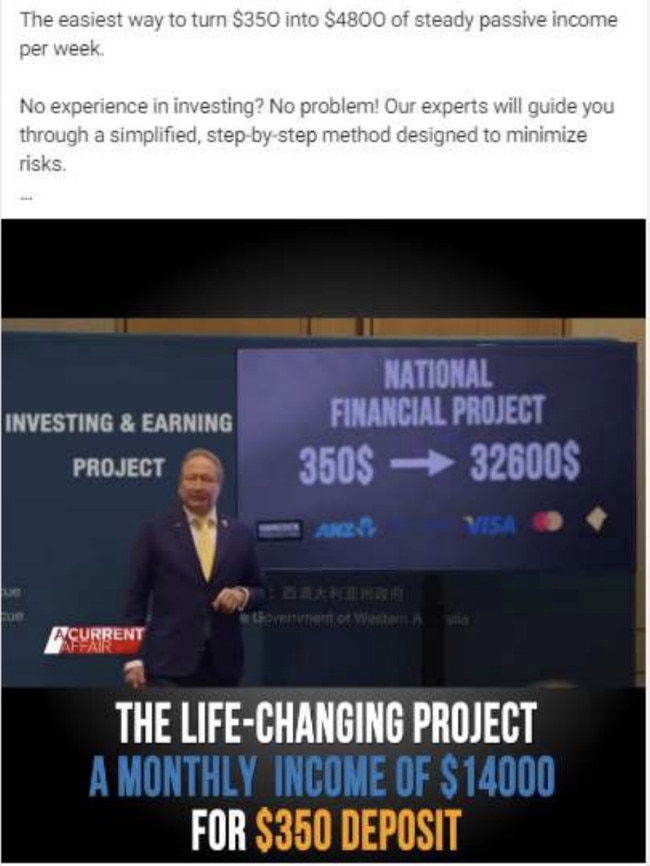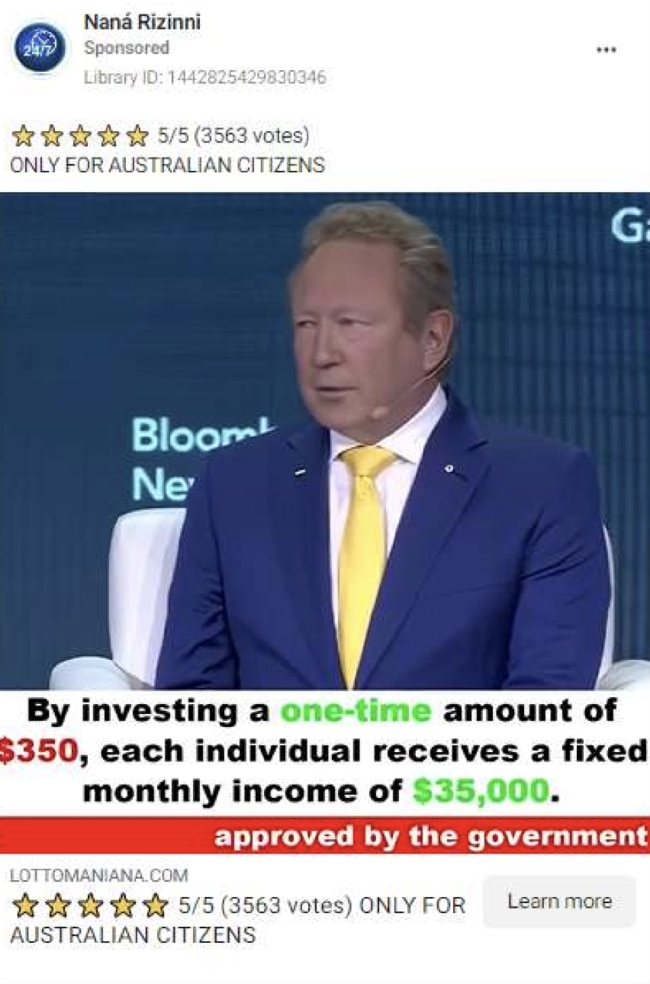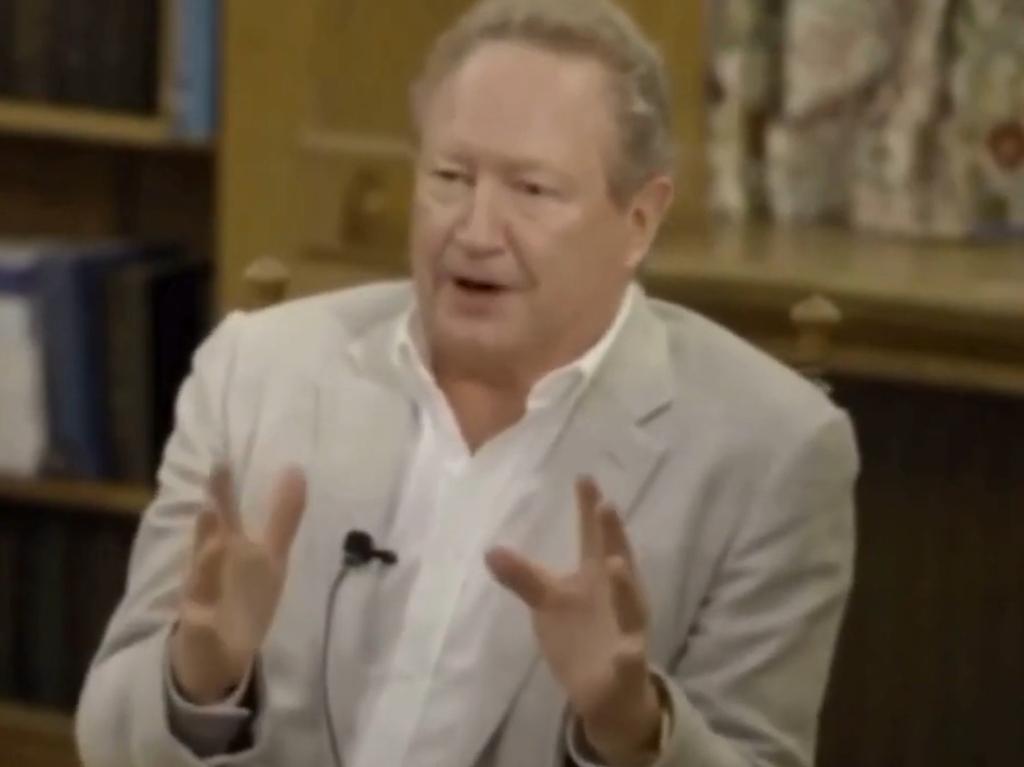Andrew Forrest brands Meta ‘recalcitrant’ as it allegedly seeks to dodge scam laws
Mining billionaire Andrew Forrest has spent hundreds of thousands of dollars investigating Meta’s Facebook scams, with the mogul making a number of shocking allegations.
Meta is using a near 30-year-old US law in an alleged attempt to evade prosecution over scams and fraudulent advertising running rife on Facebook and its other platforms in Australia, an explosive lawsuit by mining billionaire Andrew Forrest claims.
The Fortescue Metals executive chairman has been pleading with Meta for the past decade to remove scam advertisements from its platform, which he says have “bilked innocent Australians out of millions” of dollars.
Dr Forrest first raised the fraudulent advertisements with Meta in 2014.
But the tech giant told him to set up a “verified” Facebook page to combat the scammers. This was despite him not wanting to be on social media, and when he did sign up, it failed to stamp out fraud and Australians being fleeced.
Dr Forrest is now suing Meta in California, where the company’s headquarters are located and it claims to have immunity from liability over fraudulent posts and other material that is published across its apps, according to court documents.
The law in question is Section 230 of the Communications Decency Act, which US Congress enacted in 1996 to protect internet companies from liability of content posted by third parties. In subsequent years, tech giants have claimed that extends to digital advertising – a position Dr Forrest is challenging.
Meta has been contacted for comment.

Dr Forrest’s complaint in the US District Court also claims that Meta has deliberately set up its corporate structure to evade regulation and prosecution in Australia, prompting him to take action in California – a move that would be beyond the reach of most Australians.
“On the basis of the ownership and structures that Meta has in fact chosen, Meta asserts that it does not do business in Australia and is not subject to Australian law, where there is no equivalent to Section 230 immunity,” the lawsuit alleges.
“But with respect to Dr Forrest’s claims brought in California, Meta asserts that it is entitled to Section 230 immunity. In doing so, Meta is seeking to circumvent Australian law, denying Dr Forrest access to justice in either Australia or in California.
“Its recalcitrance in submitting to jurisdiction in Australia are all a result of deliberate corporate choices designed to export Section 230 immunity to cover Meta’s advertising and other activities abroad, so that Meta can continue to run its advertising business exactly as it wants, without regard to any harm it causes anywhere in the world.”

Dr Forrest isn’t the only one challenging Section 230 immunity. Apple co-founder Steve Wozniak is suing YouTube over scams that featured his likeness.
Despite Meta claiming it does not do business in Australia, the Australian Competition and Consumer Commission found that Australian advertising revenue for Meta-owned Facebook and Instagram in FY21-22 was between $4.7bn and $5.1bn.
Dr Forrest said he has spent “hundreds of thousands of dollars”, investigating the criminals behind the scam ads as well as increasing cybersecurity and defending himself and his business reputation.
“Currently, upon information and belief, the scammers involved in engaging Meta’s services to produce and distribute the current Scam Ads are located in areas outside the United States, including Eastern Europe and Southeast Asia.

“Meta also services its Australian users from offshore. Meta’s automated digital review of advertising occurs offshore from Australia. Any manual review of advertising content is undertaken in weakly regulated, low-labour-cost Asian countries; and the law enforcement liaison and data centres for Meta’s Australian social media platforms are in Singapore.”
The Australian revealed this week that a single international fraud syndicate had duped more than 30,000 Australians out of hundreds of millions of dollars with the help of mass advertising campaigns on Facebook and other online platforms. At least seven Australians have lost more than €1m ($1.7m) each, according to initial data analysis. One lost €3.3m.
Data from mobile security company Zimperium – which protects the devices of US troops – has detected close to 100,000 Meta-related scams, compared with 3344 hits on X, 11,612 on Telegram and 148 on Reddit.
“The effect of the scam ads on Australian users has been far-reaching,” Dr Forrest’s lawsuit states.
“One Australian woman was victimised by the Scam Ads, losing approximately $670,000. The woman said that on or about March 28, 2019, she accessed her Facebook account and was presented with a scam ad that included alleged interviews with Dr Forrest and suggested an association with the Australian Broadcasting Corporation.
“Similarly, on or about April 1, 2019, an Australian man logged onto his Facebook account and was presented with an ad depicting Dr Forrest sitting on a stage, which gave the appearance that he was participating in a question-and-answer session on cryptocurrency. The man clicked on the link and was ultimately swindled out of $77,254.”
A 72-year-old Western Australian known as “FZ” lost $250,000 – which he has not been able to recover – after being duped by a scam Facebook advertisement that featured Dr Forrest’s image in 2019.
Dr Forrest raised the “proliferation of scam ads” with managing director and vice president of Meta in Australia, William Easton, in May 2019, demanding that “Meta dedicate its enormous and sophisticated machine learning and human resources to prevent any further dissemination of the scam ads”.
“It’s well known William (Easton), that you have the most sophisticated machine learning and artificial intelligence tools for targeting advertising at users. What amazes me is your absolute lack of concern, and more worrying your obstinance in using machine learning to keep your platform free of obvious scams,” Dr Forrest wrote.
“All of these threaten users like me, the integrity of public discourse, and allow innocent mums, dads, and retirees to be robbed of their savings. If this was you or (Meta founder and chief executive) Mr (Mark) Zuckerberg being framed, or your own parents, or his losing their hard earned retirement savings, I know you would react immediately and effectively.”

Mr Easton replied: “I appreciate this is very frustrating for you — it’s an extremely challenging, industry-wide problem which we are working to address. However I do want to be very clear – scam ads are not permitted on Facebook. They violate our Advertising Policies and have no place on the platform”.
Meta did not take down the fraudulent advertisements, Dr Forrest’s lawsuit states. He then raised the issue in an open letter to Mr Zuckerberg, who did not respond.
“Meta Ads is an advertising business, not an interactive computer service. It has a separate purpose, a separate function, and is run on a separate ads platform (Ads Manager) that generates commercial speech in the form of completed, paid-for ads. It uses its own features and applications, and follows a different business model than Meta’s social media platforms.
“Through its comprehensive “suite” of advertising tools and applications, Meta Ads controls every aspect of the production of each ad, thereby gaining a substantial amount of information about each advertiser, its products, and its objectives. The production process provides Meta with ample opportunities to detect ads that are fraudulent or that misappropriate information or images that belong to others, before such ads are included in the inventory vying for advertising space on Meta’s social media platforms,” the lawsuit states.






